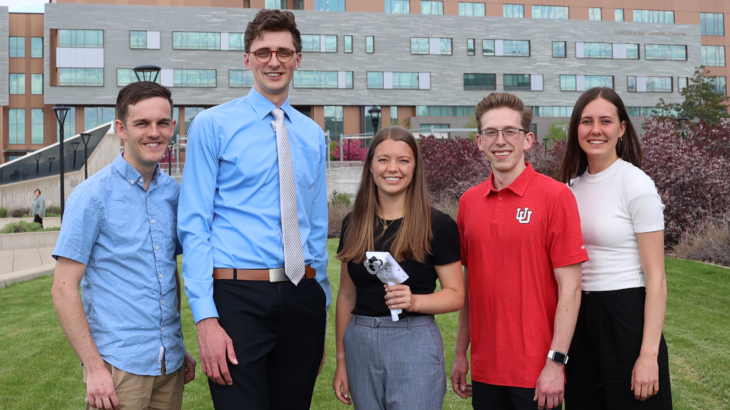C-Blu is a medical device company working to increase the accuracy of cervical cancer screening. C-Blu recently won first place at the 2024 Bench to Bedside Competition, a medical device innovation competition.
The team includes five University of Utah students: Ethan Betts, Libby Brooks, Derek Lewis, Ryleigh Smith, and Nathan Wallace. The students are studying biomedical engineering and business.
Cervical cancer is one of the most treatable forms of cancer. If diagnosed early, survival rates can be as high as 91%. However, the current survival rate is 50%, with 94% of deaths happening in low-resource areas where effective screening is unavailable.
“We built a cervical cancer screening device that can be taken into low-resource areas,” Brooks said. “Improving screening rates can help eliminate cervical cancer — something the World Health Organization is trying to do in the next six years.”
“In low-resource areas right now, they use visual inspection for screening,” Wallace said. “Our goal is to make that significantly more effective for more accurate screening.”
Cancerous tissue has a higher concentration of DNA than healthy tissue. By using a certain wavelength of blue light, the DNA in cells fluoresces, and cancer cells appear brighter than healthy cells. By shining blue light on the cervix, doctors can more easily identify cancer cells — hence the name C-Blu. This technique makes cancer diagnosis through visual inspection more accurate and could improve colposcopy-directed biopsies.
Many steps go into making a medical device, from heavy regulation to testing. The team learned partnerships are key. “It took a lot of collaboration with a lot of people from very diverse backgrounds to come together for our project to actually work,” Smith said.
“It matters a lot how good your technology and idea are, but that doesn’t matter if you can’t get it out into the world,” Lewis said. “The manufacturing and production process is just as important as having an idea that works.”
The team has developed a fully functioning prototype. They hope to sell to organizations equipping humanitarian groups and low-resource areas with medical supplies. “It can go out to field clinics where they can treat women and save lives,” Betts said. “It’s a simple treatment, but they need to know if they have cancer first.”



